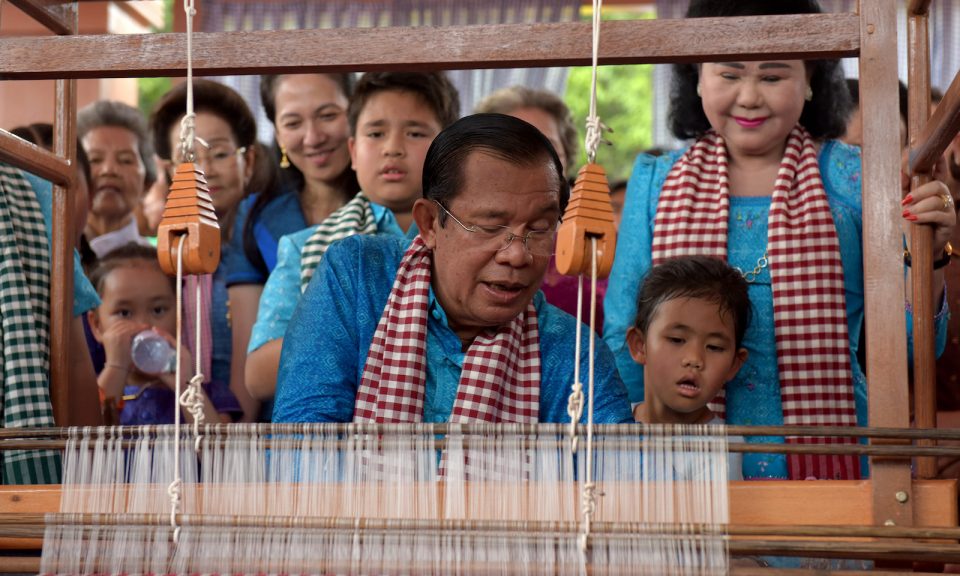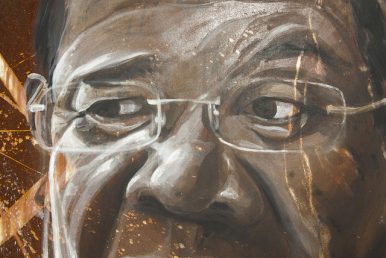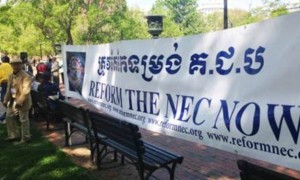EBA Cambodia
now browsing by tag
Hun Sen’s populism hangs by a thread
Cambodian leader’s election vow of higher minimum wages and seniority payments for garment workers has put new economic pressure on an industry that was already coming undone
ជាសរុប នយោបាយប្រជាភិថុតិរបស់របបហ៊ុន-សែនចំពោះកម្មករ-កម្មការិនីរោងចក្រកាត់ដេរបានកំពុងមានវិបាកកម្មត្រឡប់មករកខ្លួនវិញ ក្នុងខណៈការរំលាយនិងរំលោភលើសិទ្ធិនយោបាយរបស់គណបក្សសង្គ្រោះជាតិក៏ជាចំណាប់ខ្មាំងចងខ្លួនលោកហ៊ុន-សែនភ្ជាប់ទៅនឹងសសរកន្លោងផងដែរ។ លោកហ៊ុន-សែនរៀបចំជួបកម្មកររាប់មុឺននាក់តាមរោងចក្រដោយតម្រូវអោយរោងចក្របង់ថ្លៃម៉ោងដែលគេមកចូលរួមស្តាប់លោក ហើយលោកហ៊ុន-សែនមានស្រោមសំបុត្រលុយអោយពួកគេពីដៃផ្ទាល់ផងដែរ។ មិនតែប៉ុណ្ណោះ មានការតំឡើងប្រាក់ខែអតិបរមាពី១៧០ដុល្លាមួយខែកាលពីឆ្នាំមុនមក១៨២ដុល្លាក្នុងមួយខែដើមឆ្នាំនេះ បង្កើតច្បាប់បង់ប្រាក់អតីតភាព(severance pay)ដល់កម្មករបើមានការបណ្តេញពីការងារ បង់ប្រាក់បុព្វលាភនិងប្រាក់បំណាច់(seniority bonuses and indemnities) ព្រមទាំងផលប្រយោជន៌(benefits)ផ្សេងទៀត ដោយបើកប្រាក់ខែដូរពីបួនអាទិត្យ(មួយខែ)ម្តងទៅជាពីរអាទិត្យម្តង។ ជាការសំគាល់ រោងចក្រមួយចំនួនបានបិទទ្វារ អត្រានាំចេញឆ្នាំ២០១៨មានត្រឹម៤ភាគរយ ចុះមកពី១៩ភាគរយ ហើយអុឺរ៉ុបបានចាប់ផ្តើមយកពន្ធអង្ករកម្ពុជា និងរៀបចំនីតិវិធីដកEBA។

Op-Ed: Asia Time
That approach bore fruit, despite widespread and persistent criticism of official corruption and limited labor rights. Cambodia’s embrace of free market policies catapulted the economy in the 2000s, growth rates that underwrote the CPP’s staying power.
Cambodia’s largest export industry is facing its biggest crisis, with garment workers and security
But, according to Chanco, the “broad thrust of the [the CPP’s] policies have been populist – and in many cases, interventionist – in nature” since the 2013 general election, when it was nearly beaten by the opposition CNRP. At the time, the opposition had campaigned on a manifesto of higher wages and other populist measures.
The minimum wage of garment workers remained largely static up until 2013, but the CPP has “co-opted the CNRP’s minimum wage agenda over the last five years,” says Chanco.
The CPP arguably felt the need to expand even further its populist pledges after it dissolved the CNRP in November 2017 and in the run-up to last July’s general election, which it won overwhelmingly in a poll many observers viewed as a sham.
As the CPP promised on the hustings, the monthly minimum wage for garment factory workers rose on January 1 to US$182, up from $170 last year. That marks a near 300% increase from the $61 minimum wage earned by workers in 2012.
One independent estimate suggests that the latest minimum wage hike will cost garment sector employers an additional $90 million in wages and bonuses this year.

Hun Sen poses for a picture during a ceremony at a compound of factories in Phnom Penh on September 6, 2017. Photo: AFP/Tang Chhin Sothy
Added to this, thanks to CPP promises made last year, employers must now pay workers fortnightly, not monthly, a logistical headache which will also raise administrative and financial costs.
“It’s absolutely the case that Cambodia’s minimum wage has increased too fast over the past few years,” says Chanco.
He says wages have been hiked while labor productivity has remained stagnant and in places even fallen in recent years. At the same time, the price of Cambodia’s garment products has also fallen on international markets without improvements in quality.
Now at $182 per month, Cambodia’s minimum wage for garment workers is only a few dollars less than wages in Vietnam and is considerably higher than the average wages paid in Bangladesh.
Vietnam, which exported $35 billion worth of garment products last year, considerably more than Cambodia, also has far better industrial and logistical infrastructure and boasts overall higher productivity rates, analysts say.
That’s reflected in the cost of power, with electricity rates in Cambodia almost $0.20 per kilowatt-hour, while in Vietnam they are about $0.07.
The World Bank’s Logistics Performance Index ranked Cambodia 98 out of 160 global countries. Vietnam was ranked 39, Thailand 32 and Indonesia 46.
The Cambodian government will spend considerably more of its budget in 2019, which increased by 11% from last year, on infrastructure, public works, urban development and vocational training. Investment from China, its main ally, will also bolster Cambodia’s infrastructure.
But there are rising concerns that this may be too little, too late, as Cambodia’s manufacturing rivals, Vietnam, Bangladesh and Myanmar, are also investing heavily in their own manufacturing capabilities.

Cambodian People’s Party supporters in an open truck during campaigning in Phnom Penh for the July 7, 2018, general election. Photo: AFP/Tang Chhin Sothy
Politics are also hurting Cambodia’s competitiveness. The EU is now weighing whether to withdraw Cambodia from its Everything But Arms scheme, which grants Cambodian exports duty-free status.
Cambodia exported roughly $5.8 billion worth of goods to the EU in 2017 under the scheme. The loss of that access is already prompting some investors and purchasers of Cambodia-made goods to move to other, more competitive markets, according to industry reports.
In December, the Ministry of Commerce reported that exports grew by just 4% in 2018, worth $11.2 billion, compared to 19% growth the previous year. Under a new government edict introduced by the government last September and which came into effect on January 1, factory owners now must also make new payments for seniority to employees.
Intended to replace severance pay, in which owners had to pay workers if they were laid off, the new seniority bonus equates to the wages of 15 days’ work and other benefits, and must be paid annually, half in June and the other half in December.
In December, thousands of garment workers went on strike because they wanted seniority payments to be made in one lump-sum rather than two payments made each year, as the law stipulates.
Garment workers who spoke to Asia Times on the condition of anonymity said they are fearful that their employers could try to change their contracts to cancel out their back pay, or could abscond from the country without paying their bonuses.
There are also fears that after factory owners make the first tranche of seniority payments in June, they will face cash-flow problems, meaning they could close down before the second set of payments are made in December.

Workers gather as they rally to mark May Day in Phnom Penh, Cambodia, May 1, 2018. Photo: Reuters/Samrang Pring
Following the recent unrest, some 1,200 workers were sacked by garment factories in the capital because of their “illegal” strikes, a move supported by local courts.
Some analysts, however, argue that the strikes were merely an excuse for garment factory employers to slim down their workforce in anticipation of falling shipments and profits.
“These new policies, especially the seniority payment, are being blamed for layoffs in the garment sector,” said Sophal Ear, associate professor of diplomacy and world affairs at Occidental College at Los Angeles.
The Garment Manufacturers Association in Cambodia (GMAC), an industry body, “is justifying manufacturer layoffs of employees but disregarding who is to blame: not the employees, but the government for coming up with these policies,” he added.
“So why isn’t the government stopping these layoffs? Because it can’t. It launched a policy to get garment workers’ love, but then manufacturers get around it by laying off workers.”
There is not a reliable estimate of how much the seniority payments will cost employers. But it is likely to be in the tens of millions of dollars, especially considering that payments could be backdated for almost 10 years, while some liberal guesses put the total figure close to $100 million.
Continue reading on full article in Asia Time…
Cambodian PM warns of ‘dead’ opposition if EU withdraws preferences
Op-Ed: Reuters
“If you want the opposition alive, don’t do it and come and hold talks together,” he said.
PHNOM PENH (Reuters) – Cambodian Prime Minister Hun Sen on Monday threatened to retaliate against the opposition if the European Union withdraws duty-free trading access over human rights concerns.

The EU in November began a formal procedure to strip Cambodia of its Everything but Arms (EBA) status, after Hun Sen returned to power in a July general election in which his party won all of the seats after a crackdown on the opposition.
“If you want the opposition dead, just cut it,” Hun Sen said in a speech at the inauguration of a ring road around the capital, Phnom Penh, addressing the European Union and referring to Cambodia’s EBA status.
“If you want the opposition alive, don’t do it and come and hold talks together,” he said.
EBA is an initiative aimed at helping poorer countries. It can be withdrawn in the case of serious violations of human rights conventions.
The EU threatened to withdraw the trade preferences because of a crackdown on the opposition ahead of the July election, which the EU condemned as not being credible.
Hun Sen, 66, who also marked 34th year of his premiership on Monday, said that he would not forgive those who had appealed to Western countries to cut aid to press his government, and said critics should get ready to flee abroad.
“People are prepared to flee, be prepared,” Hun Sen said.
“I won’t forgive them.”
Cambodia’s Supreme Court dissolved the main opposition Cambodia National Rescue Party (CNRP) and banned 118 party members in 2017 at the request of the government after accusations that the party was plotting to take power with the help of the United States.
The party and the United States rejected any such plot.
CNRP leader Kem Sokha was released from prison in September after spending more than a year in jail on treason charges but remains under house arrest in Phnom Penh.
Read More …











